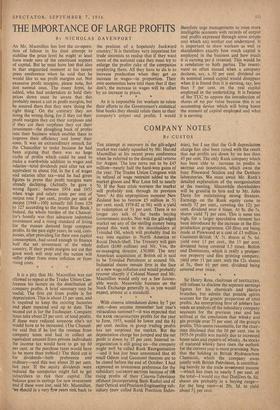THE IMPORTANCE OF LARGE PROFITS
BY NICHOLAS DAVENPORT As Mr. Macmillan has lost the co-opera- tion of labour in his final attempt to stabilise the price level he might at least have made sure of the continued support of capital. But he must have lost that also in that unguarded moment at his recent press conference when he said that he would like to see profit margins cut. Not excessive profit margins, please note, but just normal ones. The many firms, he added, who had undertaken to hold their prices down must be aware that this probably meant a cut in profit margins, but he assured them that they were 'doing the right thing.' On the contrary they are doing the wrong thing, for if they cut their profit margins they cut their surpluses and if they cut their surpluses they cut their investment—the ploughing back of profits into their business which enables them to improve their efficiency and lower their costs. It was an extraordinary remark for the Chancellor to make because he had been arguing that there was no huge cache of profits which could be used to make a worthwhile addition to wages and salaries—total dividends paid after tax are equivalent to about 10d. in the of wages and salaries after tax—and he had given figures to prove that profit margins were already declining. (Actually he gave a wrong figure : between 1954 and 1955 when wage and salary costs per unit of output rose 5 per cent., profits per unit of output [1948=100] actually fell from 129 to 127 according to the recent Blue Book.) Indeed, the whole burden of the Chancel- lor's homily was that adequate industrial Investment and a rising standard of living for the masses demand large company profits. In the past eight years, he said, com- panies, after providing for their own capital consumption, had saved enough to finance half the net investment of the whole country. If their profit margins are cut this good work will stop and the nation will suffer either from more inflation or from rising costs. * *
the position of a hopelessly backward country.' It is therefore very important for trade unionists to realise that if they want more of the national cake they must try to enlarge the profits cake of the companies employing them. All they have to do is to increase production when they get an increase in wages—in proportion. Their own economists have told them that if they don't, the increase in wages will be offset by an increase in prices.
As it is impossible for workers to relate their efforts to the Government's statistical blue books they should relate them to their company's output and profits. I would therefore urge managements to issue more intelligible accounts with records of output and profits expressed through some simple unit which any worker can understand. It is important to show workers as well as shareholders exactly how much capital is employed in the business and how much it is earning per £ invested. This would be a revelation to both parties. The resent- ment so often caused when a company declares, say,, a 50 per cent. dividend on its nominal issued capital would disappear when it is found that it is earning, say, less than 5 per cent. on the real capital employed in the undertaking. It is fatuous of the TUC to oppose the introduction of shares of no par value because this is an accounting device which will bring home the amount of capital employed and what it is earning.


































 Previous page
Previous page